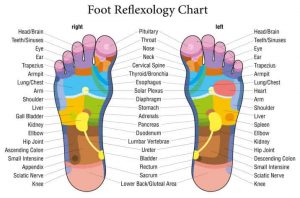Our bodies are meant to be self-regulating and self-healing. However, due to stress, lack of sleep, and toxins, we do not heal as we should. Over time, energy flow in the body becomes constricted. This can cause a multitude of health issues that could lead to an even worse diagnosis in the future. Unfortunately, desperation usually leads people to seek alternative answers as a last resort. Before it gets to that point, let’s explore the therapeutic effects of energy healing: Enter reflexology!
It’s so much more than a foot massage.
What is Reflexology
Reflexology is a whole-body treatment that helps reduce pain, promote relaxation, and reduce stress by affecting the nerves, blood flow and energy of the entire body. The practice is an “ancient art” with a long history, but only recently made its way to the US in the last century. It’s not voodoo or witchcraft. It’s not too good to be true. When you think about it logically, it really makes sense. There are reflex points on the feet and hands which correspond to every part of the body. Through application of pressure on particular areas of the hands or feet, reflexology serves to relax tension, improve circulation and promote the natural function of the related area in the body.
The Science
The body’s internal organs and nervous system are connected to various areas of the body—including the feet. There are more than 7200 nerve endings in each foot that can be affected by toxins that accumulate due to the effect of gravity. These toxins crystallize and impact nerve endings. There are reflexes on the feet and hands that correspond to every part of the body. Reflexology requires applying pressure in a very precise manner on the reflexes to send an electrical current to the corresponding body part. This will jump-start sluggish organs and help to re-balance and normalize the entire body.
There are four theories that describe how reflexology works (Dr. Axe):
- Central Nervous System Adaption Theory: This theory is based on the late 19th century discovery by Englishmen Sir Henry Head and Sir Charles Sherrington that uncovered a relationship between our skin and organs, in which external stimuli (i.e., application of pressure on the hands or feed) causes the nervous system to trigger a desired healing effect.
- Gate Control Theory: The gate control theory refers to pain being a subjective experience created by the brain, hence the pain-relieving characteristic of reflexology occurs because massage improves mood and stress.
- Vital Energy Theory: Bordering on the ancient concept of yin and yang, this theory claims that stress impedes the flow of the “vital energy” that exists in each human body — reflexology helps keep the flow uninhibited.
- Zone Theory: The most common in the US is based on the principle that our hands and feet can be charted into “reflex zones” that correspond to organs and other parts of the body.
Who Needs It
Well, for starters, let me just say that everyone needs reflexology. EVERYONE. If you are looking for ways to feel less stressed, more relaxed, and more energized, you need reflexology.
Reflexology is used in hospices and hospitals to improve emotional, spiritual, psychological, and physical well-being. Some people with medical conditions find they feel less pain and discomfort if they have less stress. There are several studies of the benefits of the therapy that shows it boosts feelings of well-being and makes it easier to manage conditions such as:
- Anxiety
- Stress
- Fatigue
- Immune Disorders
- Pain
- PMS/Menopause
- MS
- Diabetes
- Sinusitis
- Cancer
- Cognitive Decline
- Heart Disorders
*Reflexology is meant to be complementary to medical treatments. It should not be used as an alternative.
Final Thoughts
When practiced skillfully, reflexology may help reduce pain, promote relaxation, and reduce stress by affecting the nerves, blood flow and energy of the entire body. At Forum Health Clarkston, we offer a reflexology package. Call today! 248-625-5143
Adrian Schirr
Forum Health Clarkston
7300 Dixie Hwy. Ste. 500
Clarkston, MI 48346
248-625-5143
Nuviewnutrition.com
References:
https://draxe.com/health/reflexology/
https://www.webmd.com/balance/what-is-reflexology#1

